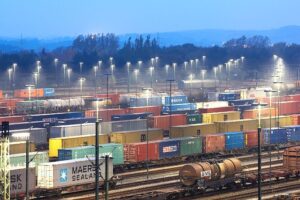 On February 18 Greater Spokane Incorporated (GSI) and the Washington Council on International Trade (WCIT) hosted Keep Trade Moving, a program focused on the importance of freight mobility in the Inland Northwest. The morning included keynote presentations from Ashley Probart, Executive Director of the Washington State Freight Mobility Strategic Investment Board (FMSIB) and Eric Schinfeld, President of WCIT. Brad Gile, Logistics Center Manager for Caterpillar Inc.’s Spokane Distribution Center, joined Ashley and Eric for a panel discussion.
On February 18 Greater Spokane Incorporated (GSI) and the Washington Council on International Trade (WCIT) hosted Keep Trade Moving, a program focused on the importance of freight mobility in the Inland Northwest. The morning included keynote presentations from Ashley Probart, Executive Director of the Washington State Freight Mobility Strategic Investment Board (FMSIB) and Eric Schinfeld, President of WCIT. Brad Gile, Logistics Center Manager for Caterpillar Inc.’s Spokane Distribution Center, joined Ashley and Eric for a panel discussion.
The ability to move goods efficiently is vitally important to any economy, but especially in Washington state and the greater-Spokane region because, as noted by Schinfeld:
- 46 US states use Washington ports to export their products
- 70% of goods coming through ports of Seattle and Tacoma heads to the rest of the United States
- Freight rail contributes $28.5 billion to the Washington state economy (7.5% of state GDP)
- More than 533 million tons of freight were moved in Washington in 2010, and that number is expected to grow by 86% by 2040
With Spokane-area manufacturers, agricultural producers, and forestry and mining companies exporting $800 million worth of goods annually, quality infrastructure is key to getting those products to market. Eric also noted that freight congestion on Washington highways costs shippers more than $3 billion per year.
Ashley highlighted the recently passed state and federal transportation packages and their potential impact on the Inland Northwest. Connecting Washington is a 16-year package with $16 billion in additional transportation revenues. The package includes $879 million earmarked for the completion of the US 395 North Spokane Corridor.
Fixing Americas Surface Transportation (FAST) Act is a five-year bill which includes:
- 5.1% increase over historic funding to each state
- New freight focus
- Washington state formula funding is estimated at $100 million with state determining distribution of funds subject to Freight Network criteria
FMSIB was created by the Legislature to identify and recommend investments that improve and mitigate freight movement on strategic state corridors, grow jobs and the economy, and bolster Washington as a leader in international trade.
Ashley noted current and planned FMSIB projects in Eastern Washington, including:
- Sullivan Bridge Replacement – Scheduled completion in fall 2016. Construction estimate of $12.3 million, with FMSIB share of $2 million and City of Spokane Valley estimating $1.5 million
- Barker Road BNSF Crossing – The proposed project will construct a grade-separated intersection of Barker Road at SR290 and the BNSF Railroad lines. FMSIB share is $10 million
- Bigelow Gulch/Forker Road Realignment – This project reconstructs and adds capacity to the Bigelow Gulch/Forker Corridor from Bigelow Gulch Road to Progress Road. Project is divided into seven projects, with FMSIB as a partner on three (one is complete). Funding is secured for FMSIB phases with the FMSIB share being $7.69 million
FMSIB’s 2016 call for projects begins this month with awards in late spring or early summer. Projects are selected based on state criteria, project scoring and Board selection. Ashley stressed that when communities are exploring projects they need to plan (years) ahead and that successful projects are typically part of a consistent community vision.
Also unveiled at Keep Trade Moving was a study by WCIT revealing the economic impact of the 2014-2015 West Coast port slowdown. Some of the study’s conclusions about the slowdown:
- Resulted in near-term loss of $769.5 million to Washington businesses
- An estimated $555.8 million worth of exports were not shipped via waterbourne containers
- Businesses spent an additional $152.6 million on airfreight shipments, resulting in a net loss by value of $403.2 million
- Delayed or delinquent delivery of imported goods through Washington ports destined for Washington businesses summed to an estimated $345.1 million
- Overall, businesses incurred exponentially higher storage and shipping costs and incalculable losses to business and future contracts
Spokane County businesses exported $800 million worth of goods in 2014. GSI’s International Trade program works to enhance the regional economy and support job creation through the continued growth of this local trade activity.




